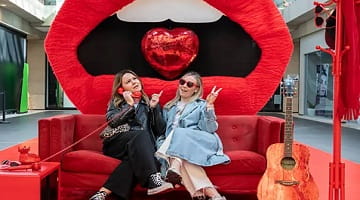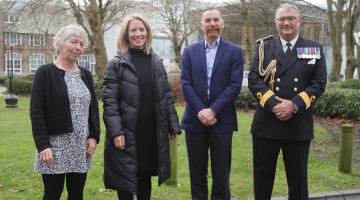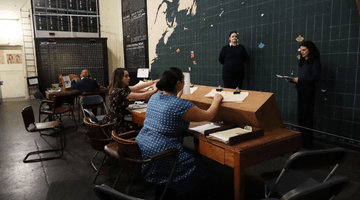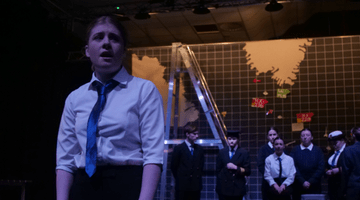Why study this course with LJMU?
- This is a brand-new degree designed to push the boundaries of technology in art and develop your performance skills
- 3 MINUTE WATCH: some of our students explain why you should apply for this degree
- Taught by an academic and technical team with decades of experience in drama and the performing arts, performance and technology
- Delivered in three dynamic strands: Performance, Socially Engaged Practices and Production
- Based in the Liverpool Screen School where you will have access to a dedicated performance theatre and sector-leading equipment
- Students will receive opportunities to collaborate with community partners, creating thoughtful and dynamic work that tackles a variety of social issues
- You will have access to the Production Unit Liverpool Screen School, a dedicated team which aims to make you an employable, highly skilled and confident graduate
About your course
Drama reimagined for the 21st Century - Discover the BA (Hons) Performance and Production at Liverpool John Moores University.
Are you passionate about bringing your creative ideas to life? Do you want to craft performances that not only resonate with audiences but also respond to the needs of communities? Are you excited to push the boundaries of technology in art and develop your performance skills across a variety of live performance and digital contexts including performing for film and radio?
If so, the BA (Hons) Performance and Production is the perfect fit for you.
The degree is divided into three dynamic strands: Performance, Socially Engaged Practices, and Production. These strands interweave, giving you a comprehensive understanding of how to create impactful work that speaks to diverse audiences and meets real-world needs.
Throughout your studies, you will deep dive into contemporary performance, discovering how today’s most innovative work is being created and produced. You will have the chance to develop your performance skills in both live performance and recorded settings; whether that’s through drama and acting, voice work, film, radio, podcasts or presenting. You will have opportunities to collaborate with community partners, creating thoughtful and dynamic work that tackles a variety of social issues. These collaborations will allow you to make a real impact, using your creativity to address the challenges faced by different communities while developing your skills in meaningful, hands-on projects.
Collaboration is a key component of this degree; you will have the chance to work with students from other departments across the university. This will broaden your perspective and deepen your understanding of creating and performing new work.
Technology is also at the heart of the teaching of the degree, empowering you to experiment with new mediums and enhance your creative work. You will explore how to blend the latest digital tools with traditional techniques to create performances that are relevant, engaging, and forward-thinking. You will also learn about industry workflows in film, radio and performance production.
Course modules
What you will study on this degree
Further guidance on modules
Modules are designated core or optional in accordance with professional body requirements, as applicable, and LJMU’s Academic Framework Regulations. Whilst you are required to study core modules, optional modules provide you with an element of choice. Their availability may vary and will be subject to meeting minimum student numbers.
Where changes to modules are necessary these will be communicated as appropriate.
Core modules
Core modules
Optional modules
Core modules
Your Learning Experience
Excellent facilities and learning resources
From the moment you join the course, we will be exploring the endless possibilities in contemporary performance making.
From day one, you’ll be introduced to a wide-range of creative techniques and ideas, giving you the freedom to experiment and discover what truly excites you.
By the time you reach your final year, you’ll have honed the skills and tools needed to specialise in an area you’re passionate about, bringing your unique vision to life through your final project.
Assessment varies depending on the modules you choose, but will usually include a combination of exams and coursework.
We appreciate that all students perform differently depending on how they are assessed, which is why we use a combination of assessment methods.
The programme uses a varied range of assessment process to enhance and strengthen the student experience, including the practical production of performances and artefacts (both digital, live and a mixture of both), essays (both written and recorded), presentations, journals and reflections.
Where you will study
The School is based in the Redmonds Building, in the heart of the bustling Mount Pleasant Campus and Liverpool's growing Knowledge Quarter. The building is home to high quality lecture theatres and seminar rooms, TV studios, radio suites, green screen, editing rooms and newsrooms, social spaces, and a café. It is only a short walk from LJMUs Aldham Robarts Library, which contains all the resources you will require for your studies.
Performance and Production students also have exclusive access to the John Foster Drama Centre, where you will hold performances, rehearsals and castings. The Drama Centre has been home to LJMU's Drama teaching for a number of years and has hosted a wide variety of performances, it has dressing rooms, a café bar and wardrobe rooms so you will be immersed in a real-world drama environment for the duration of your studies.
Career paths
Opening doors to a wide range of careers
This is a brand new type of Performance degree.
BA (Hons) Performance and Production has been designed to be collaborative, industry-facing and versatile, deriving from the high quality pedigree of decades of teaching in drama.
It aims to help you to open doors to a wide range of exciting career opportunities in the arts and beyond, setting you up for a successful future after graduation.
Throughout the Performance & Production programme, we have embedded comprehensive projects where you will apply your skills in real-world scenarios. These projects will involve collaboration with industry partners, providing you with practical experience and professional connections. A series of workshops focused on career development are integrated into the final year curriculum; topics will include CV writing, interview techniques, networking strategies, and job search skills. These workshops are tailored to the specific needs of the performance and production industries.
We have established strong partnerships with leading companies and organisations in the performance and production sectors. These partnerships facilitate a range of internship and placement opportunities for our students, allowing you to gain hands-on experience and develop professional skills. Many modules include industry-based projects where you will work on real-world challenges provided by our industry partners. These projects simulate professional work environments and will help you to develop practical skills and industry knowledge. We offer dedicated professional practice modules that focus on work-based learning. These modules include placements, live briefs, and industry collaborations, ensuring students gain substantial work-based experience throughout their studies
Students will have access to the Liverpool Screen School's Production Unit (PULSS), a specialist work-based learning team dedicated to ensuring Screen School students receive opportunities to undertake paid and unpaid work during their studies. PULSS provides assistance on developing CVs, job applications and careers advice.
Student Futures - Careers, Employability and Enterprise Service
A wide range of opportunities and support is available to you, within and beyond your course, to ensure our students experience a transformation in their career trajectory. Every undergraduate curriculum includes Future Focus during Level 4, an e-learning resource and workshop designed to help you to develop your talents, passion and purpose.
Every student has access to Careers Zone 24/7, LJMU's suite of online Apps, resources and jobs board via the LJMU Student Futures website.
Tuition fees and funding
- Full-time per year:
- £9,535
Fees
The fees quoted above cover registration, tuition, supervision, assessment and examinations as well as library membership and student IT support with access to printed, multimedia and digital resources including programme-appropriate software and on campus Wi-Fi.
Financial Support
The University offers a range of scholarships to support students through their studies. You'll find all the information you need on our specialist funding pages, including details of the Student Support Fund and other activities to support with the cost of living.
Additional Costs
In addition to fees, students should also keep in mind the cost of:
- Accommodation
- Travel costs including those for placements, visas and travel for studying abroad and field trips unless paid for by LJMU
- Stationery, IT equipment, professional body membership and graduation gown hire
The University reserves the right to increase tuition fees in accordance with any changes to the maximum allowable fees set by the UK Parliament. In the event of such a change, any fee increase will be subject to a maximum cap of 10% of the total course cost as originally stated at the time of your offer.
Entry requirements
Please choose your qualifications below to view requirements
Grades/points required from qualifications: BCC-BBB (104-120)
Work out how many UCAS points your qualifications are worth by visiting the UCAS Tariff Calculator.
Qualification requirements
How to apply
Securing your place at LJMU
UCAS is the official application route for our full-time undergraduate courses. Further information on the UCAS application process can be found here https://www.ljmu.ac.uk/study/undergraduate-students/how-to-apply.
Your university life
From accommodation and academic support to clubs and societies. Find out what LJMU has to offer.
Related Links
Talk to our students
Connect with a current LJMU student for advice and guidance on university life, courses and more.
See what our students are saying
At LJMU we want you to know you're making the right choice by studying with us. You can see what our students are saying about their experience with us through their reviews on the following websites:
Related Links
News and views
Browse through the latest news and stories from the university
The university reserves the right to withdraw or make alterations to a course and facilities if necessary; this may be because such changes are deemed to be beneficial to students, are minor in nature and unlikely to impact negatively upon students or become necessary due to circumstances beyond the control of the university. Where this does happen, the university operates a policy of consultation, advice and support to all enrolled students affected by the proposed change to their course or module.
Further information on the terms and conditions of any offer made, our admissions policy and the complaints and appeals process.
























.png)



